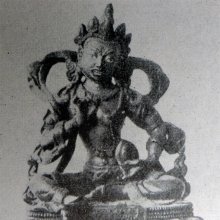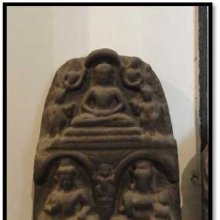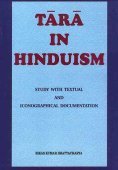Jaina: 16 definitions
Introduction:
Jaina means something in Hinduism, Sanskrit, Jainism, Prakrit, Marathi, Hindi. If you want to know the exact meaning, history, etymology or English translation of this term then check out the descriptions on this page. Add your comment or reference to a book if you want to contribute to this summary article.
Images (photo gallery)
In Hinduism
Shaktism (Shakta philosophy)
Source: ORA: Amanaska (king of all yogas): (shaktism)Jaina (जैन) refers to “followers of the Jain principles”, according to the 17th century Kaulagajamardana (“crushing the Kaula elephant”) authored by Kāśīnātha or Kṛṣṇānandācala.—Accordingly, [as Īśvara said to Pārvatī]: “[...] O great Goddess, hear about the Jain (jaina). He always carries a pitcher. He is simply a soul and never an enjoyer, doer and destroyer. He is called a Jain, and Buddhists and [the like] are considered [to be similar]. Some pluck out their hair and dress in white, my dear, and [some] wear red garments and [others wear] indigo and so on. Some are called, 'great guru', and others pursue nonviolence. These are the different varieties in brief; they are [all] called Pāṣaṇḍas [because] they have been excluded from the vedic path. [...]”

Shakta (शाक्त, śākta) or Shaktism (śāktism) represents a tradition of Hinduism where the Goddess (Devi) is revered and worshipped. Shakta literature includes a range of scriptures, including various Agamas and Tantras, although its roots may be traced back to the Vedas.
In Jainism
General definition (in Jainism)
Source: The University of Sydney: A study of the Twelve ReflectionsJaina (जैन) refers to the “worshippers of the Jina”, according to the 11th century Jñānārṇava, a treatise on Jain Yoga in roughly 2200 Sanskrit verses composed by Śubhacandra.—Accordingly, “The wishing tree of the true doctrine which is firm, whose large and very thick root has come forth from compassion for various living souls, whose twelve reflections are massive branches, which is guidance for a householder, whose excellent trunk is the way to heaven, whose splendid blossom is heavenly bliss [and] whose fruit is virtuous inactivity, is caused to ascend by worshippers of the Jina (jaina) from water in the teachings of the splendid Jinas which are richly wooded”.
Source: Singhi Jain Series: Ratnaprabha-suri’s Kuvalayamala-kathaJaina (जैन) refers to the “Jaina religion”, according to Uddyotanasūri in his 8th-century Kuvalayamālā (a Prakrit Campū, similar to Kāvya poetry).—The Kuvalayamala (779 A.D.) is full of cultural material which gains in value because of the firm date of its composition. [...] Page 175.10: Here is a reference to Jaina Śāsana in which the word Jaina has been used for the teaching of religion of the Tīrthaṃkaras. During the 7th century, in the writings of Bāṇa, the terms Jina, Jinendra, Jinanātha and Jaina were used with reference to Buddha and Buddhism, and the same is the case in the Amarakośa and the Lalitavistara, etc. It is an open question as to when for the first time the word Jaina was used in its present meaning.

Jainism is an Indian religion of Dharma whose doctrine revolves around harmlessness (ahimsa) towards every living being. The two major branches (Digambara and Svetambara) of Jainism stimulate self-control (or, shramana, ‘self-reliance’) and spiritual development through a path of peace for the soul to progess to the ultimate goal.
Languages of India and abroad
Marathi-English dictionary
Source: DDSA: The Molesworth Marathi and English Dictionaryjaina (जैन).—m (S) A follower of the principles of a jina or teacher of heterodox notions; the chief of which are The supremacy of certain pontiffs over the gods of the Hindus; a denial of the divine authority of the Vedas; and a disregard of the distinction of castes.
Source: DDSA: The Aryabhusan school dictionary, Marathi-Englishjaina (जैन).—m A follower of the principles of jina.
Marathi is an Indo-European language having over 70 million native speakers people in (predominantly) Maharashtra India. Marathi, like many other Indo-Aryan languages, evolved from early forms of Prakrit, which itself is a subset of Sanskrit, one of the most ancient languages of the world.
Sanskrit dictionary
Source: DDSA: The practical Sanskrit-English dictionaryJaina (जैन).—a.
1) A Jaina, a follower of Jaina doctrines.
2) A Buddha.
Derivable forms: jainaḥ (जैनः).
Source: Cologne Digital Sanskrit Dictionaries: Shabda-Sagara Sanskrit-English DictionaryJaina (जैन).—m.
(-naḥ) A Jaina, a follower of the principles of a Jina or teacher of heterodox notions, the chief of which are, the supremacy of certain religious pontiffs over the gods of the Hindus, a denial of the divine authority of the Vedas, and a disregard of the distinction of castes. E. jina a Jina, and aṇ aff. jinaḥ devatā asya .
Source: Cologne Digital Sanskrit Dictionaries: Cappeller Sanskrit-English DictionaryJaina (जैन).—[feminine] ī belonging to the Jinas; [masculine] a Jaina.
Source: Cologne Digital Sanskrit Dictionaries: Monier-Williams Sanskrit-English Dictionary1) Jaina (जैन):—[from jaitra] mf(ī)n. relating to the Jinas, [Sarvadarśana-saṃgraha iii f.; Pārśvanātha-caritra ii, 36]
2) [v.s. ...] m. a worshipper of the Jinas, Jaina, [Sarvadarśana-saṃgraha iii, vii, xi]
3) [v.s. ...] (= زين) Name of a prince of Kaśmir
Source: Cologne Digital Sanskrit Dictionaries: Yates Sanskrit-English DictionaryJaina (जैन):—(naḥ) 1. m. A Jaina, one who denies the supremacy of the gods, the authority of the vedas, and the distinction of castes.
Source: DDSA: Paia-sadda-mahannavo; a comprehensive Prakrit Hindi dictionary (S)Jaina (जैन) in the Sanskrit language is related to the Prakrit word: Jaiṇa.
[Sanskrit to German]
Sanskrit, also spelled संस्कृतम् (saṃskṛtam), is an ancient language of India commonly seen as the grandmother of the Indo-European language family (even English!). Closely allied with Prakrit and Pali, Sanskrit is more exhaustive in both grammar and terms and has the most extensive collection of literature in the world, greatly surpassing its sister-languages Greek and Latin.
Hindi dictionary
Source: DDSA: A practical Hindi-English dictionaryJaina (जैन) [Also spelled jain]:—(nm) a follower of Jainism—a religious order; a Jain.
...
Prakrit-English dictionary
Source: DDSA: Paia-sadda-mahannavo; a comprehensive Prakrit Hindi dictionary1) Jaiṇa (जैण) in the Prakrit language is related to the Sanskrit word: Jaina.
2) Jaiṇa (जैण) also relates to the Sanskrit word: Jayin.
3) Jaiṇa (जैण) also relates to the Sanskrit word: Javin.
Prakrit is an ancient language closely associated with both Pali and Sanskrit. Jain literature is often composed in this language or sub-dialects, such as the Agamas and their commentaries which are written in Ardhamagadhi and Maharashtri Prakrit. The earliest extant texts can be dated to as early as the 4th century BCE although core portions might be older.
Kannada-English dictionary
Source: Alar: Kannada-English corpusJaina (ಜೈನ):—
1) [adjective] of or belonging to Jina, the Jaina spiritual teacher.
2) [adjective] of, related or according to Jaina religion, scriptures, etc.
--- OR ---
Jaina (ಜೈನ):—
1) [noun] a follower of Jaina religion.
2) [noun] a Jaina teacher.
3) [noun] Jina, the highest spiritual Jaina teacher.
4) [noun] the Jaina religion, founded in the 6th century B.C., which emphasises the perfectibility of human nature and liberation of the soul, esp. through asceticism and non-violence toward all living creatures.
Kannada is a Dravidian language (as opposed to the Indo-European language family) mainly spoken in the southwestern region of India.
See also (Relevant definitions)
Starts with (+3): Jainacaina, Jainacarya, Jainadarshana, Jainadharma, Jainagama, Jainakamam, Jainamaina, Jainamata, Jainamatakhandana, Jainamatapustaka, Jainanagara, Jainapala, Jainarupa, Jainasaina, Jainasamaya, Jainashasana, Jainashrama, Jainatana, Jainataramgini, Jainatarangini.
Ends with: Dijaina, Jajaina, Jajjaina, Sajaina.
Full-text (+4400): Arhata, Anekantavadin, Shalakapurusha, Mandita, Bodhida, Jina, Mahamanasi, Anantavirya, Acaranga, Purushapundarika, Jinendra, Sthulabhadra, Karpuraprakarana, Mahagiri, Jnanapravada, Jagatprabhu, Kshayopashama, Parameshthin, Padmaprabha, Vidyadevi.
Relevant text
Search found 137 books and stories containing Jaina, Jaiṇa; (plurals include: Jainas, Jaiṇas). You can also click to the full overview containing English textual excerpts. Below are direct links for the most relevant articles:
A study of the philosophy of Jainism (by Deepa Baruah)
Chapter II.e - The doctrine of Anekāntavāda (the theory of manifoldness) < [Chapter II - Jaina theory of Knowledge]
Chapter I.a - Historical background of Jainism < [Chapter I - Introduction]
Brahma Sutras (Shankara Bhashya) (by Swami Vireshwarananda)
Nirvikalpaka Pratyaksha (study) (by Sujit Roy)
The Tattvasangraha [with commentary] (by Ganganatha Jha)
Verse 311 (the doctrine of ‘Soul’ according to the Digambara Jainas) < [Chapter 7 - Doctrine of the Self (ātman, ‘soul’)]
Verse 3151-3153 < [Chapter 26 - Examination of the ‘Person of Super-normal Vision’]
Verse 2183-2184 < [Chapter 24a - The case for the reliability of the Veda (the Revealed Word)]
Jainism in Odisha (Orissa) (by Ashis Ranjan Sahoo)
Monoliths (chaumukha/chaturmukha shrines) < [Chapter 4]
Jaina Antiquities in Kupari (Balasore) < [Chapter 3: Survey of Jaina Antiquities in Odisha]
Jain symbols in Art < [Chapter 5]
Bhagavati-sutra (Viyaha-pannatti) (by K. C. Lalwani)
Related products








